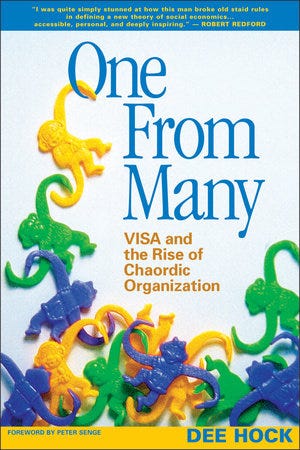Dee Hock: The Anti-capitalist Banker
The Practical Polymath #29
Hi Friends,
Greetings from sweltering hot New York. A friend of mine once said that cold weather is always better than hot weather. When it’s cold you can always add a layer but with heat there’s only so much you can take off.
I’m trying something new this week. This edition is entirely dedicated to a personality whose ideas are timeless but who is not necessarily very well known. And of course, I picked somebody with a strong polymath game. I am planning to do these profiles of past and present polymaths once in a while. Tell me what you think!
Until next week,
Florian
Dee Hock: The Anti-capitalist banker
The largest global payments company in the world was founded by an anti-capitalist.
The company is Visa. His name is Dee Hock.
Let’s rewind to the 1960s. Credit cards were having a moment. But there was one problem: the proliferation of different cards created huge headaches for merchants and banks. Enter Dee Hock. The only way forward, he thought, was to convince competitor banks to collaborate. After a series of heated meetings the largest banks in the world came to an agreement. Visa was born.
Ten years after this groundbreaking success, Dee Hock decided to walk away from fame and fortune. What did he do? He spent the next decade in near total isolation immersed in nature, making sense of what he had learned. He would obsessively seek the answer to three specific questions:
Why are organizations everywhere, whether political, commercial, or social, increasingly unable to manage their affairs?
Why are people, everywhere, increasingly in conflict with and alienated from the organizations of which they are part?
Why are society and the biosphere increasingly in disarray?
Here are two of my favorite ideas from Dee Hock.
The organization of the future must be chaordic.
During his years in isolation, Hock spent a lot of time observing nature. One of his major observations was how the natural world was organized in stark contrast to human institutions. In his memoir he writes:
''Nothing in nature feels like church or school. There’s no black bird “principal” pecking away at the rest of the flock.There’s no “super” frog telling the others how to croak. There’s no “teacher” tree lining up the saplings and telling them how to grow.”
He saw in nature a fantastically efficient model of self-organization blending elements of chaos and order. This delicate equilibrium was the foundation of his vision for Visa. No single person in the Visa alliance was hierarchically superior to another. Alongside the Internet, which was born around the same time, Visa was one of the first truly decentralized forms of organization. Or as he coined it, a “chaordic” organization. Unlike “command-and-control” institutions such as schools, churches or nation-states, he believed chaordic organizations enabled human ingenuity to truly flourish.
Money is the worst system to capture value.
For someone who came up with the world’s leading system of financial payments, Dee Hock surely doesn’t like money very much.
He regarded our most selfless acts of caring as the essence of our best functioning types of organizations: family & community. This wasn’t just some hippie vision of the world. He recognized that this fundamental law served a very specific purpose.
“The nonmonetary exchange of value does not arise solely from altruistic motives. It arises from deep, intuitive, understanding that self-interest is inseparably connected with community interest; that individual good is inseparable from the good of the whole; that all things are simultaneously independent, interdependent, and intradependent—that the singular “one” is inseparable from the plural “one”. [The nonmonetary exchange of value] requires no currency, contracts, government, laws, courts, police, economists, lawyers, or accountants. It does not require anointed or certified experts of any kind. It requires only ordinary, caring people.”
Money, on the other hand, interfered with this equilibrium. The temptation to reduce a system and assign monetary value to its constituent parts leads to the destruction of our most precious resources.
Dee Hock’s ideas offer an unforgiving lens on today’s world. Could it be that the crises of democracy, healthcare, education or climate are really just a symptom of our institutions inability to cope with our age? What would it look like to build economies that are incentivized to build community and preserve natural resources?
Weekly Wisdom
📺 What is Chaordic? Dee Hock is a notoriously secretive individual. You won’t find a lot of interviews of him lying around. One exception is this 7-part interview series from 2020. In the excerpt below, he shares his definition of “chaordic”.
📗 One from Many: In his seminal book, Dee Hock recounts the story of how Visa was created and makes his case for redesigning the archaic institutions that govern our modern life. This is the kind of mind-expanding book I return to often.The writing can sometimes be abstract but it is also packed with good stories and a disarming sense of humor.
🐦 Wisdom for your Timeline: Despite claiming that “participation in the world of electronic information and communication” is not exactly his cup of tea, you can find 92-year-old Dee Hock regularly dropping bombs of wisdom on Twitter. His DMs are not yet open but I read that if you email him here, he does respond.
Lateral Thought
“If you think you can’t, why think.”
Dee Hock






This was awesome. I never knew about Dee Hock. Such a cool guy